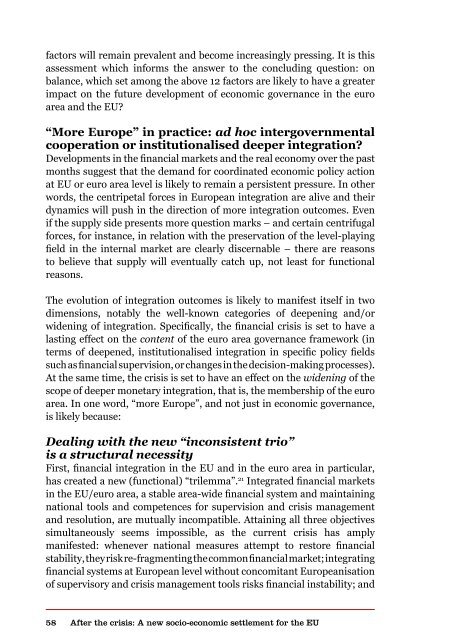Authors Iain Begg | Gabriel Glöckler | Anke Hassel ... - The Europaeum
Authors Iain Begg | Gabriel Glöckler | Anke Hassel ... - The Europaeum
Authors Iain Begg | Gabriel Glöckler | Anke Hassel ... - The Europaeum
You also want an ePaper? Increase the reach of your titles
YUMPU automatically turns print PDFs into web optimized ePapers that Google loves.
factors will remain prevalent and become increasingly pressing. It is this<br />
assessment which informs the answer to the concluding question: on<br />
balance, which set among the above 12 factors are likely to have a greater<br />
impact on the future development of economic governance in the euro<br />
area and the EU?<br />
“More Europe” in practice: ad hoc intergovernmental<br />
cooperation or institutionalised deeper integration?<br />
Developments in the financial markets and the real economy over the past<br />
months suggest that the demand for coordinated economic policy action<br />
at EU or euro area level is likely to remain a persistent pressure. In other<br />
words, the centripetal forces in European integration are alive and their<br />
dynamics will push in the direction of more integration outcomes. Even<br />
if the supply side presents more question marks – and certain centrifugal<br />
forces, for instance, in relation with the preservation of the level-playing<br />
field in the internal market are clearly discernable – there are reasons<br />
to believe that supply will eventually catch up, not least for functional<br />
reasons.<br />
<strong>The</strong> evolution of integration outcomes is likely to manifest itself in two<br />
dimensions, notably the well-known categories of deepening and/or<br />
widening of integration. Specifically, the financial crisis is set to have a<br />
lasting effect on the content of the euro area governance framework (in<br />
terms of deepened, institutionalised integration in specific policy fields<br />
such as financial supervision, or changes in the decision-making processes).<br />
At the same time, the crisis is set to have an effect on the widening of the<br />
scope of deeper monetary integration, that is, the membership of the euro<br />
area. In one word, “more Europe”, and not just in economic governance,<br />
is likely because:<br />
Dealing with the new “inconsistent trio”<br />
is a structural necessity<br />
First, financial integration in the EU and in the euro area in particular,<br />
has created a new (functional) “trilemma”. 21 Integrated financial markets<br />
in the EU/euro area, a stable area-wide financial system and maintaining<br />
national tools and competences for supervision and crisis management<br />
and resolution, are mutually incompatible. Attaining all three objectives<br />
simultaneously seems impossible, as the current crisis has amply<br />
manifested: whenever national measures attempt to restore financial<br />
stability, they risk re-fragmenting the common financial market; integrating<br />
financial systems at European level without concomitant Europeanisation<br />
of supervisory and crisis management tools risks financial instability; and<br />
58<br />
After the crisis: A new socio-economic settlement for the EU

















